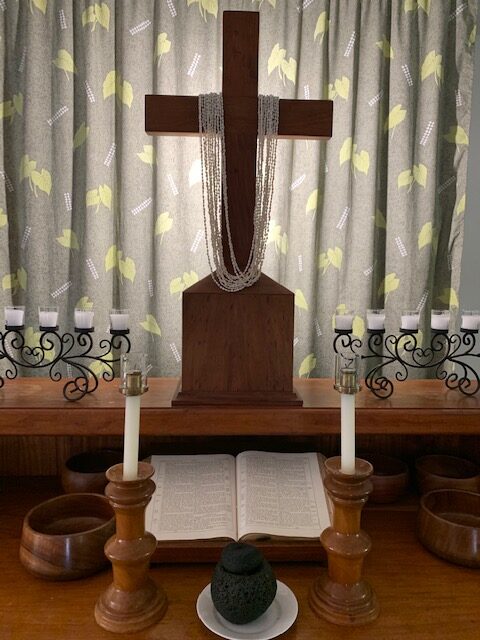August 25, 2024 – Fourteenth Sunday After Pentecost
Kahu Gary Percesepe

So Jesus asked the twelve, “Do you also wish to go away?” 68 Simon Peter answered him, “Lord, to whom can we go? You have the words of eternal life ~ John 6: 67-68
Bette Midler appeared before an adoring crowd, sharing her life story in granular detail. Suddenly, she stopped and joked, “Well, enough of me talking about myself, let’s hear all of you talk about me!”
We laugh because this rings true about ourselves. There’s constant pressure to conform to the spirit of the age and become preoccupied with self.
Martin Luther defined sin as, “the heart curved in on itself.” Curved in on ourselves, we cannot see the interests of others, let alone God’s.
Someone asked the great Methodist preacher Will Willimon what he focused on as he listened to the hymn just prior to his sermon. Willimon confessed he sometimes wondered How do I look? Am I going to do well? Will they like what I say? Have I come here with the right sermon, at the right time, for the right congregation? Will they like me?
Pressed further, Willimon said he was grateful for that sacred moment that always seemed to come in the final pause before he opened his mouth, when he no longer thinks about anything except the word of God he is to deliver. Preachers become what they intend to preach.
Writers, artists, musicians, will tell you the same thing. The creative life is what the poets Keats called “negative capability,” by which he meant writing that is not about me at all. I’m just a way for the work to get itself written. In the field I am the absence of field. My best writing is the art of receiving, transmitting, what is happening without me. Self-forgetfulness.
Self-forgetfulness is what Charles Wesley means in the hymn we just sung, to be “lost in wonder, love, and praise.” Oh, to lose ourselves! To lay down the burden of constantly monitoring the performative self, wondering how we appear to others, whether they like us, whether we are good enough, pretty enough, smart enough, interesting enough. Oh, to lay the small, false, “performance self” dead at the foot of the cross and behold Jesus, the man for others, the self-giving Christ, the bread of life, to feast on him. We starve for just one honest moment of self-forgetfulness. If we cannot find it in worship, where else in the world is it to be found?
As Jesus looks out over his disciples, he admits that following him ultimately isn’t really our choice at all. He says, “no one can come to me unless it is granted by the Father.” Our decision for God is superseded by God’s decision for us. Peter puts it plainly: “Lord, to whom can we go?” There is no other choice.
Do we love God because of what we get out of it? Imagine if God loved us that way! Like a lover who says, “I’m in love with her because I get great things out of this relationship. Whatever I ask she will do for me. I can use her to get anything I want.” But that is not love! Love that loves someone to get something isn’t Christian love. That is not how we want to be loved.
What we crave is someone to love us when we are unlovely, to look past our faults to see our beauty and childlike fear, someone who gets us, someone who loves us for no good reason. Why does God love us, messed up and selfish as we are? God loves us because God is love. All God can do is love us. This is how we are to love our neighbor and ourselves.
This one great love is the greatest journey of all. It centers us, it heals us, and yes, it saves us. Let me say it plainly: Jesus saves us from ourselves.
Simone Weil wrote that humanity once was able to walk away from God, but Jesus’ crucifixion changed everything: “As for us, we are nailed in place, free only to direct our gaze.” We can choose to look up at Jesus or away—to accept or reject the challenge and the promise of the cross, what Peter calls the “words of eternal life” that are always calling to us.
What might our lives look like if we directed our gaze to Jesus? What if we were no longer afraid of difficult teachings? Would we associate with different people? Would we use our time differently? Would we create public policy that balances tourism with our kuleana to aloha ‘Aina? Would we meditate on our State Motto: Ua Mau ke Ea o ka ʻĀina i ka Pono? Would we spend money differently?
Autumn approaches. This could be the most significant time of the year for our church. Will we choose to go deeper into Jesus, to ingest him, to feast on him, to drink deeply to quench our thirst for a more satisfying life, one not centered on ourselves but the needs of a world ablaze in terror and fear of the future? We get to make the choice. This sermon is not about you and what you want. It’s about God getting what God wants. God wants you all in. Because God is for you. God is all in for you. Amene.